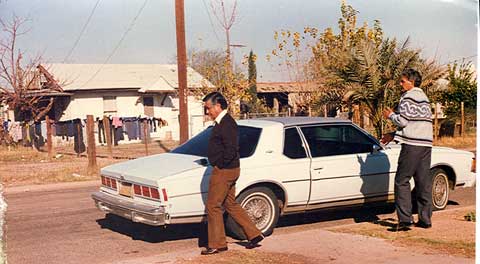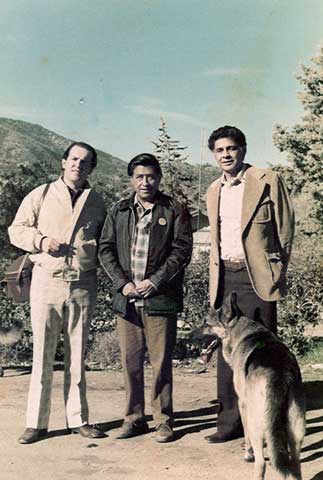Rebecca Cruz
Cesar and Me

My memory is of a great man who changed the way in which I view humanity. I remember as a teen going to a rally at St. Agnes Catholic church in Phoenix AZ that opened my mind and heart at the same time. I recall handing out flyers for a cause to which I had not given much attention. The speaker, who I knew as a friend, was Cesar Chavez the Farm Workers Union Leader. The rally was great and inspiring. His speech was uplifting and powerful and he spoke in Spanish, which to me was a powerful voice; he spoke in the tongue of those who he represented, the poor Mexican farm workers.
The borderlands of ethnicity, class and nations shape the ways in which people are looked at and accepted into society this border can be unfair and unjust. Employers had been using these farm workers for cheap labor; treating them as if they were not worthy of civil rights. At this rally, a piece of his national movement, Cesar showed a film about how pesticides affected the workers women and men and even the communities in which these farms were located. To this day I can feel the emotion of the video, which showed some children who were born of these farm workers who were working under these conditions with deadly pesticides. These children suffered from being physically deformed and some been born without limbs. Most of these children did not have medical opportunities let alone medical attention.
That day at the rally Cesar Chavez gathered together his "compañeros” to speak of truth “si se puede.” I was filled with emotions: first anger, repression, sadness, frustration, then came a sign of hope listening to the power of people’s cries and unity to make change. This day becomes clearer and clearer to me as I step into the world to do my part of reaching out to work for humanity. The day at this rally was a step into the borderlands of national cultures; Mexico and U.S., viewing the differences in class, ethnicity, gender, rationalism and socioeconomics. This day linked me to an opportunity to dig deeply within my self and look for the4 importance of life and as I have grown into adult hood. I am seeking to help make change in society to some how make a difference in our social structure in great old America.
A specific farm worker lets call her Lupita, with a family as a mother and wife she is a great example of those who suffered from dangerous pesticides and inhumane acts. Lupita, had a few children and her husband also worked in the fields; one of her sons who I clearly remember; he was in his adolescence years born without limbs. I remember her and her family because their story was used by Cesar Chavez, as he did others' stories, to reach out to the public in dire need to formulate change. Her story was common to other farm worker’s like many used to get the issues of hazardous living conditions across to those individuals who could promote change. The rally held a discussion of the usage of dangerous pesticides and how the farm workers were living and working in an unsafe environment, Lupita gracefully and heartbroken would open up to the interviewers to share her family’s situation with hope for humanity. She would look around the room in amazement as the look on her face would share her mental thoughts of hope and change.
Lupita, would calmly reach out to the audience with a detailed description about her son who was born without limbs and explain how this tragedy affected her family. This was one of the first cases documented and connected to hazardous use of pesticides used by the giant farm owners. She was a strong woman who became one of many spokes persons for mothers and farm workers who have suffered with their children’s birth defects. After the birth of these children they continued to work in the farms because they could not afford to lose wages. These farm workers were in desperate need of changes in the fields and in their living conditions. Lupita, knew first hand the consequences of working in a dangerous environment and the depth of how it would affect her family’s well being and future she had no choice but to continue working. She needed to provide for her family. For her there was no other choice. She now felt that it was her obligation to contribute her family’s hardship to up lift the weight of oppression and humility that other farm workers were experiencing. As she could look into the audience, courage would flow through the other farm workers participation and actions for change within their living and working environment. Lupita would briefly share in her experience to show that it was not right to treat farm workers as if they were not human by using such dangerous pesticides.
Farm workers such as Lupita and many there is many more stories of suffrage, anguish and unworthiness lead Cesar Chavez to a historical moment in his movement. This was his first fasting on the steps of the White House, with great awareness and support from the public and political leaders who helped to contribute strength to this moment in history. This movement made tremendous changes of how farm workers are now treated with a better environment for their working and living conditions. Lupita and others got to be apart of this history made through many years of tears, hatred, cruelty, feeling unworthy and separation from family and friends. As I heard and watched Lupita I thought to myself; that she had to have known that deep down it was her duty to share her story and a blessing to be apart of god’s will: to rise up and challenge and fight the “giant” to announce change for her compañeros.
I was first introduced to Cesar Chavez because of a rally; the labor union worked together with the farm workers union to unify the voices, this represented unification. At this rally something happened to me, this incident opened my eyes and my heart to care about what would happen to another person. I never realized the importance of life until I began supporting causes such as this specific one lead by Cesar Chavez. This cause bridged my culture of being an educated American with a legal voice, with those less fortunate. My awareness /knowledge that when there is suffering that is so wrong and people are being dangerously harmed and the individual’s inner being is being destroyed, brought me to an unfamiliar place spiritually, emotionally and physically. I wanted to do so much, I wanted to advocate doing something to promote change; the best way to describe is to HELP, and as a teen the limitations are so restricted. Then when I came into adulthood living life consumed my time to focus on my family and what life has to offer.
The borderlands of this incident taught me the things that I was not aware of. It is different when you read about something but when you experience it life change at the root of your heart. For me this was an experience that shared my ancestral culture with me. As the rally and marches continued I remember that the elder women of organizations such as Chicanos Por La Causa, which my grandmother Teri Cruz supported causes for humanity and so did many other leaders of community organizations all across the surrounding states. These elders would gather together and prepare to help in any which way possible for my grandmother and her amigas ; they would cook and prepare for the marchers so the could eat and continue to march. The borderland of heritage, language, authenticity, religion and cultural identity was a life experience for me to be humble and active. These are all small interpretations of my incident, there is so much more to share. I do pray that one day my sons will know the importance of humanitarians such as Mr. Cesar Chavez.
Looking through an adult lens, and living through life’s experiences I believe I drew from my incident knowledge and wisdom which I pray to grow with through out life’s journey. This incident was a turning point in my life, as a teen and through my adulthood. It inspired me to participate and to let my voice be heard. I know that my voice counts, and in order for it to count, I must be active by asking for change. Those are the simplest terms to describe activism to my children.
Return to Personal Memory Ethnographies
homepage
